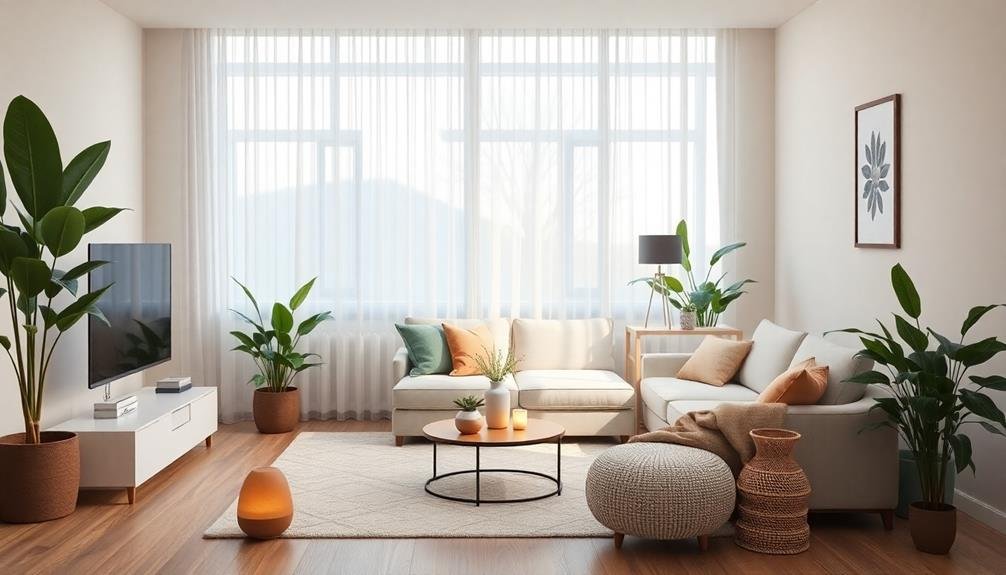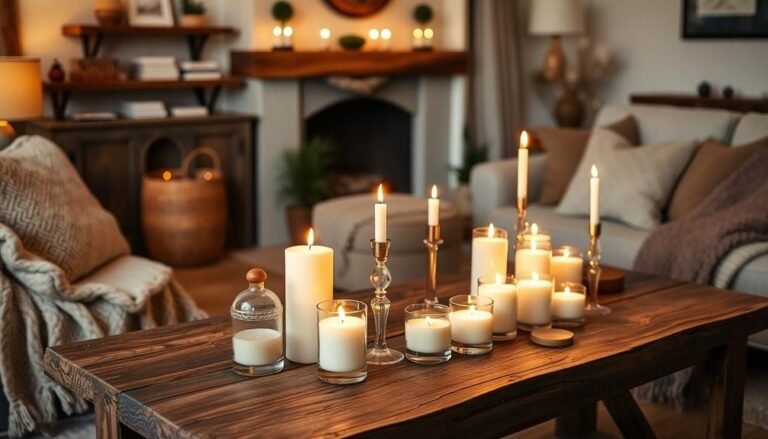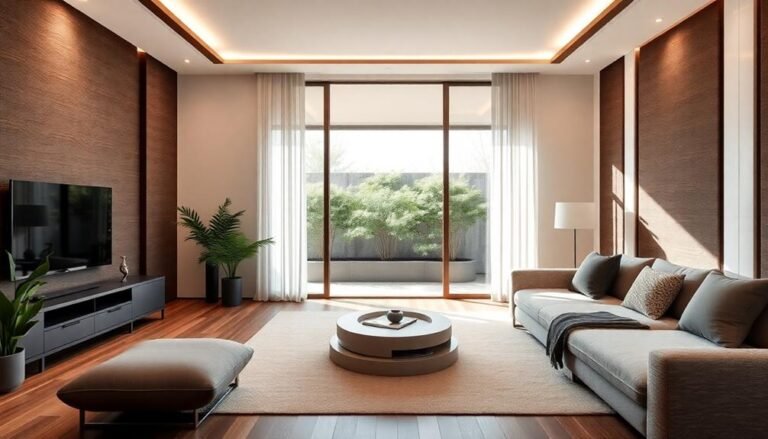Essential oils can create a calming atmosphere in your home, helping you relax and unwind. Oils like lavender and chamomile soothe anxiety and promote better sleep, while bergamot uplifts your mood and reduces stress. You can use these oils in various ways, like diffusing them in the air, adding them to your bath, or mixing your own blends for personalized scents. Designing a specific relaxation space with soft lighting and comfortable seating enhances the effect. Just remember to use essential oils safely by diluting them and keeping them away from children. If you're curious about more techniques, there's plenty to explore.
Benefits of Essential Oils

When you incorporate essential oils into your relaxation routine, you release a variety of benefits that can enhance your overall well-being. These natural extracts, derived from plants, can elevate your mood, reduce stress, and promote a sense of calm. For instance, lavender oil is well-known for its soothing properties, often helping you unwind after a long day.
Inhaling these scents can trigger positive emotional responses, activating your brain's limbic system, which plays a key role in mood regulation. You might find that certain oils, like bergamot or chamomile, can help alleviate feelings of anxiety and tension. Not only do essential oils contribute to emotional balance, but they also support physical relaxation. When used in a diffuser or added to a warm bath, they can ease muscle tension and promote better sleep, allowing you to wake up refreshed.
Moreover, the ritual of using essential oils can itself be a calming practice, providing you with a moment of self-care in your busy life. By embracing these natural wonders, you're not just enjoying pleasant aromas; you're actively nurturing your mind and body, fostering a more peaceful environment at home.
Choosing the Right Oils

Selecting the right oils can greatly enhance your relaxation experience at home. With so many options available, it's essential to choose oils that resonate with your personal preferences and desired effects. Essential oils can vary considerably in their properties, so understanding their unique qualities will help you create your ideal atmosphere.
Here are three popular essential oils you might consider:
- Lavender: Known for its calming effects, lavender oil can help reduce anxiety and promote better sleep. It's often a go-to for relaxation.
- Bergamot: This citrus oil has uplifting properties that can help alleviate stress and improve mood. Its bright scent can energize your space while still providing a sense of peace.
- Sandalwood: Often used for meditation, sandalwood oil has a rich, woody aroma that can enhance feelings of serenity and grounding. It's perfect for creating a serene environment.
Aromatherapy Diffusers

Using an aromatherapy diffuser can transform your space into a sanctuary of relaxation. These devices work by dispersing essential oils into the air, allowing you to enjoy the soothing benefits of your favorite scents. Whether you choose a traditional candle-style diffuser or an ultrasonic model, the right diffuser can enhance your home environment.
To get started, simply fill the diffuser with water, add a few drops of your chosen essential oil, and turn it on. As the mist rises, it carries the aroma throughout the room, creating a calming atmosphere. Imagine unwinding after a long day, surrounded by the gentle scent of lavender or chamomile, which can help reduce anxiety and promote sleep.
It's important to choose a diffuser that suits your needs. Some models offer timers and adjustable mist settings, allowing you to customize your experience. Additionally, consider the size of your space; larger rooms may require a more powerful diffuser to effectively distribute the aroma.
Incorporating an aromatherapy diffuser into your daily routine can be a simple yet powerful way to elevate your home's ambiance, making relaxation a priority in your life. Experience the serene benefits for yourself!
DIY Essential Oil Blends

Creating your own essential oil blends can be a fun and rewarding way to personalize your relaxation experience at home. By mixing different oils, you can craft scents that resonate with your mood and preferences. Start by selecting a few essential oils you enjoy. Consider the therapeutic properties of each one, as they can influence your relaxation journey.
Here are three simple blends you can try:
- Calming Lavender Blend: Combine 5 drops of lavender, 3 drops of chamomile, and 2 drops of bergamot. This soothing mix promotes serenity and a restful atmosphere.
- Uplifting Citrus Blend: Mix 4 drops of sweet orange, 3 drops of lemon, and 2 drops of grapefruit. This invigorating blend energizes your space, creating a cheerful vibe.
- Woodsy Grounding Blend: Blend 4 drops of cedarwood, 3 drops of frankincense, and 1 drop of patchouli. This earthy combination helps to center your thoughts and reduce stress.
Experimenting with different ratios can lead to unique blends tailored just for you. Keep track of your favorites, and soon enough, you'll have a personalized collection to enhance your home relaxation.
Incorporating Oils Into Daily Routine

Incorporating essential oils into your daily routine can transform ordinary moments into opportunities for relaxation and mindfulness. Start your day with a few drops of uplifting citrus oils, like lemon or grapefruit, in your diffuser as you prepare breakfast. This can energize your mood and set a positive tone for the day ahead.
During work or study hours, consider using calming oils such as lavender or frankincense. You can apply them to your wrists or the back of your neck, helping to ease stress and improve focus. If you find yourself feeling overwhelmed, take a moment to inhale the scent deeply, allowing it to ground you.
In the evening, create a soothing ritual by adding a few drops of chamomile or bergamot to your bath. The warm water combined with the aromatic oils can help release the day's tension. You could also incorporate essential oils into your skincare routine, using them in serums or moisturizers for added benefits.
Creating a Relaxation Space
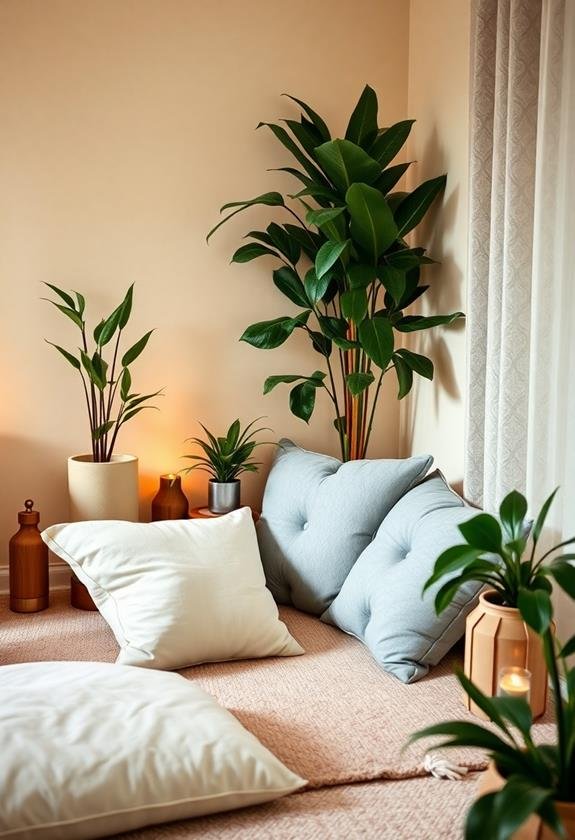
A cozy corner in your home can become a sanctuary for relaxation with just a few thoughtful touches. By creating a designated space for unwinding, you can escape the hustle and bustle of daily life. Begin by selecting a quiet area where you can comfortably sit or lie down. This space should invite serenity and calm. To enhance your relaxation corner, consider adding these three elements: incorporating an essential oil diffuser can also disperse calming aromas throughout the area, which can greatly improve your mood and create a soothing environment. Discover the benefits of essential oil diffusers to elevate your relaxation experience.
- Soft Lighting: Use warm, dimmable lamps or string lights to create an inviting atmosphere. Avoid harsh overhead lighting; instead, let soft illumination wash over the space, encouraging relaxation.
- Comfortable Seating: Incorporate a plush chair, a yoga mat, or even a bean bag. Make sure it's a spot where you can sink in and let go of tension, allowing your body to unwind completely.
- Essential Oils: Choose calming essential oils, such as lavender or chamomile, to diffuse in your relaxation space. Their soothing scents can help lower stress levels and promote a sense of peace.
Safety Tips for Essential Oils
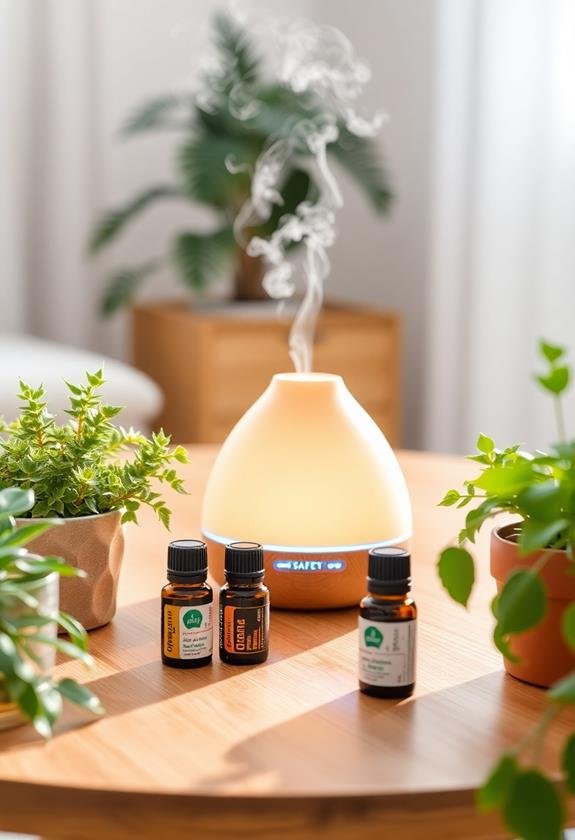
When using essential oils, it's crucial to prioritize safety to enjoy their benefits without any adverse effects. First, always dilute essential oils before applying them to your skin. Using a carrier oil, like coconut or jojoba, can help prevent irritation and allergic reactions. A general guideline is to mix one to three drops of essential oil with a teaspoon of carrier oil.
Next, be mindful of the oils you choose. Some essential oils, such as cinnamon or oregano, can be particularly potent and may cause skin sensitivity. Conduct a patch test on a small area of your skin to verify you don't experience any adverse reactions.
Also, keep essential oils out of reach of children and pets, as many oils can be toxic if ingested or improperly applied. When diffusing, confirm that your space is well-ventilated to avoid overwhelming scents, which can lead to headaches or dizziness.
Frequently Asked Questions
Can Essential Oils Help With Specific Health Conditions?
Yes, essential oils can help with specific health conditions. For instance, lavender oil is often used to alleviate anxiety and promote sleep, while peppermint oil may relieve headaches and improve focus. You'll find that tea tree oil is effective against skin issues, like acne, due to its antibacterial properties. However, it's important to consult with a healthcare professional before using them, particularly if you have underlying health concerns or conditions.
How Long Do Essential Oils Last in a Diffuser?
You might think essential oils last forever in a diffuser, but alas, they don't. Typically, essential oils linger for about 30 to 60 minutes before they start to lose their potency. However, factors like the type of oil, the diffuser's settings, and the size of the space can affect their longevity. To maximize their benefits, consider adding a few drops every hour or so, ensuring your space stays aromatic and inviting.
Are Essential Oils Safe for Pets?
When considering essential oils for your home, it's vital to think about their safety for pets. Some oils, like tea tree and eucalyptus, can be toxic to animals, causing symptoms such as lethargy or vomiting. Always guarantee proper ventilation and avoid diffusing oils in spaces where your pets spend time. If you're unsure, consult your veterinarian for advice tailored to your specific pet, as their safety should always come first.
Can I Mix Different Essential Oils Together?
Yes, you can mix different essential oils together, and it's a great way to create unique blends for various purposes. When combining oils, consider their individual properties and scents, as some may complement each other well. For example, lavender and chamomile blend beautifully for relaxation. Always start with small amounts to test the combination, and remember to dilute them with a carrier oil if you plan to apply them to your skin. Enjoy experimenting!
Where Should I Store My Essential Oils?
You should store your essential oils in a cool, dark place, away from direct sunlight and heat sources, which can degrade their quality. A cabinet or drawer works well, but avoid areas like bathrooms, where humidity fluctuates. Make sure the bottles are tightly sealed to prevent evaporation. Glass containers are preferred, as plastic can interact negatively with the oils. For long-term storage, consider using a box to keep them organized and easily accessible.

